Skyhunter Read online
Page 2
“Three Ghosts east of you. Three Ghosts north. A hundred feet away.”
They’re here.
My hands rest against the hilts of my swords. I always choose them first. They are the quietest, they have the range I need, and above all, they let me move quickly. In the trees, Corian pulls a gun from its holster and rests his finger on the trigger.
Another pause, followed by an abbreviated sign from Corian: “Warning. Close by.”
The forest’s silence gives way. The crack of twigs against rotting feet. The crumble of sodden leaves.
Then, finally, I hear it.
The gnashing of fangs wet with blood.
To my right comes the first trio. They move on all fours in a jolty skitter, their arms stretched longer than their legs. An iron cuff circles each of their necks to protect their vulnerable vein. The closest of them turns its milky eyes skyward, searching the treetops before continuing on. New blood drips down its humanlike chin.
I have seen countless Ghosts on the warfront. And yet, to this day, that four-limbed skitter still makes the hairs on the back of my neck rise.
They edge closer. As they do, the second trio comes into view. They reach up on two legs, stretching themselves tall as they peer between the trees.
My gaze focuses on the leader of the group. It is bigger than the others, its cracked muscles more prominent. Like alligators in the southern lands, Ghosts continue to grow in size and strength until something kills them. If nothing does, they will live forever. Some, I hear, tower higher than elephants.
When this one stretches itself up to its full height, it looks like a hulking beast, its skin cracked and bleeding.
Up in the trees, Corian rises into a predator’s crouch and lifts his gun. I tense, willing him to be safe. My hands close on the hilts of my swords. The stillness of the forest settles heavily on my senses, and all my strength coils tight in my muscles.
You only get one chance to move. After that, there is no room for hesitation, no time to rest or regroup or change your mind. Everything—everything—depends on your speed. You take them down fast, or they will take you down.
Corian aims his gun at the leader.
He shoots.
The bullet strikes the Ghost hard in its neck cuff, cracking the iron. It lets out a deafening shriek and whirls in Corian’s direction with a speed that defies its size. It throws itself at the tree and begins clawing furiously for him.
The others instantly turn in his direction too.
I dart from my hiding place at the same time I yank my blades out. The familiar hush of metal sliding against sheath hums in my ears. My swords catch the light. I race along a fallen log. The closest Ghost to me doesn’t even see me coming before I launch into the air and swing my blade at its neck.
It slices clean into the cuff, splitting it. My second blade cuts its vein. The Ghost collapses to the ground, twitching violently as blood stains the green forest floor crimson.
I don’t stop moving. The Ghosts are now in a frenzy of rage, their movements like the strikes of an adder.
One swipes at me. I slide to my knees and arch so far back that my head scrapes against the ground. Its claws miss me. I pop back up and slash a fatal wound in its neck, then whirl in the same move and cut through the cuff of the Ghost beside it. My other blade stabs it in the throat.
From his vantage point, Corian fires a second bullet down at the leader, hitting its neck again. It flinches away, then lunges at him. My heart lurches. From the other side of the tree, another Ghost digs its clawed hands into the trunk and tries in vain to pull itself up toward him.
I whip out my gun and fire at it. The bullet strikes true. The Ghost screams, halting its attack against Corian for an instant.
Corian points his gun down at the wounded Ghost and fires three times. The bullets shatter its neck cuff. He fires a fourth shot at the exposed vein. It stumbles to its knees.
The fifth Ghost screams at me. My boot snags against a branch on the forest floor. It costs me just a fraction of a second—but in that moment, the Ghost manages to grip my leg. It hurls me off my feet. I go crashing into the underbrush.
As I scramble back up, it’s already lunging for me again. I’m about to lift my blade when an arrow suddenly blooms right underneath its jaw, keeping it from opening its mouth. It lets out a snarl of fury. Behind it, Corian nods at me from his tree. I lash out at its cuffed neck with both blades. One, two, three slashes, and the cuff finally breaks. I yank out a dagger and stab hard into the vulnerable vein.
Only the leader remains now. Stuck with arrows, it whirls and races toward me. I pull out another dagger, tighten my grip on my blade, and brace myself for its attack. Behind it, Corian leaps down. In the blink of an eye, swords appear in his hands.
He rushes toward the Ghost. At the last second, he darts to one side. I twist to follow him. Corian slides into a crouch right as I reach him. I jump. My boot kicks off against his shoulder and I launch into the air.
I slice down hard, cutting through the cuff. It falls to the forest floor. Without missing a beat, Corian darts up from his crouch and cuts its throat.
A shudder courses through it. As I land lightly on my feet beside Corian, the Ghost falls onto all fours, then collapses to its side.
Corian looks at the bodies littered around us. My hair is tangled and mussed from the fight, and dark strands cling to my damp forehead. My senses still tingle with unease, and my body stays turned protectively toward Corian.
I push my hair back and sign to him. “Are you okay?”
He nods. We exchange a brief smile. Then he breaks his stare with me and goes to check each Ghost’s body, making sure their veins are cut clean through. I do the same, pausing to watch as he stops before the dying leader.
Corian has told me before that Ghosts remind him of humans the most when they are in their last throes. Their movements slow, their breaths curl in the air, and their shrieks, weakened, turn into the sound of something anguished and pitiful. Their eyes water with pink, blood-tinted tears. It is said that they cry because their rotting, eternally growing bodies are in excruciating pain all the time. Their dying whines are a plea for mercy.
I always warn him that they do not have the heart he has. He always reminds me that they once did, that before the Federation filled them with poison, they had smiled and laughed and been in love, that real hearts used to beat in their chests.
Even though Corian stands over the leader as its executioner, he reaches down to pick one of the blue flowers dotting the forest floor. Then he bends a knee in the middle of the glade, his long coat pooling in a circle around him, and places the flower carefully beside the body. He pulls down his mask and bows his head. His fingers sweep across the floor in a single arc. His lips move without a sound. He always does this, and it is why I respect him.
He is saying: May you find rest.
I see the seventh Ghost too late.
It is smaller than the others. Maybe it had been a child when it turned. Ghosts travel in packs—but this one had been lagging behind.
It materializes in the shadows of the woods behind Corian’s kneeling figure. Its eyes, milk-white with hatred, turn on my Shield, and its jaws open. It lunges.
My blood turns to ice. I grip my blades and rush forward.
But it is far too late. The Ghost sinks its teeth into Corian’s shoulder before he can whirl around in time. It throws him off his feet and onto his back in a single move, then dives onto his chest.
Daggers are already in Corian’s hands. He stabs at the Ghost again and again, seeking its vein. I throw myself at the beast with all my strength. It’s enough to force the Ghost’s attention onto me instead of my Shield. I cut its throat with one swing.
I slide to a halt beside Corian and press down on the wound in his shoulder. He shoves me away with a snarl. His body is already trembling, and his lips are tinted blue as if from the cold. He is signing the same words to me again and again.
“Do it. Do it.”
And I know it is over.
If your Shield is bitten by a Ghost, you must cut his throat before he turns. This is the last thing we are taught. It is taught last because none of us want to think about what it means. Because sometimes the things that cut closest to your heart deserve the weight of being last.
Corian looks straight at me. His eyes are bright with unshed tears.
I tighten my grip on my blade and stand over him. The world takes on the blur of a dream. We never break our stare. For a moment, I think I won’t be able to do it.
But my body remembers the motions, even when my mind cannot.
My blade slices through the air. There is a sickening sound, then a sigh.
The forest is still again, and I am the only one left to hear it.
I turn my face up because I cannot bear to look down. Rain beads against the forest canopy. Light rims the leaves in icy gold. It takes me a moment to realize that I am trembling.
As always, I don’t utter a sound. But a heart can grieve in silence, so I sink to my knees beside Corian’s body and allow the tears to come.
NEWAGE
INNER CITY
THE NATION OF MARA
2
When your Shield is killed in battle, it is your duty as a Striker to deliver his uniform to his family.
This is the display of shame we offer for failing to protect each other, and we give it to the family in the hopes that they accept our apology. So on this morning, one week after Corian died, I find myself heading into the heart of Newage’s Inner City, Corian’s sapphire uniform folded into a neat square and tucked safely under my coat.
The drizzle that had fallen during our sweep has now turned into a steady storm soaking the entire nation. Rain undulates in glittering waves across the pavement as I walk, and I pull my collar higher against the wetness. The hat I wear offers scant protection. My hair hangs in dripping black strings against my face, but I don’t bother brushing them aside, as if perhaps I should appear as miserable as I feel. Corian, resembling the sun as he did, had always hated the first heavy rain of winter. It is a cruel irony to deliver his uniform to his family on this day.
The Barra family estate is located at the top of a hill. From the bottom, you can’t even see it—built over the bones of a crumbling temple by the Early Ones, the mansion is fully hedged in by cypress so that onlookers can only catch glimpses of the white stone of its walls through thickets of green.
From this vantage point, I can see the gentle slope of the rest of Newage, the sprawl of estates and apartments and pillared halls protected inside two enormous circles of steel walls. Beyond that radiates the miles of dense shantytowns of the capital’s Outer City, where my mother and all other refugees live. Along the horizon rise the shapes of the Early Ones’ ruins, silhouetted against the stormy sky.
There are twenty large ruins scattered throughout Mara, and most of the other small cities that dot this country are erected upon or around them. Each of them has a name. There is Houndsfang, the ruin of a jagged steel needle jutting up toward the sky at the edge of our cliffs, upon which is set a small city of the same name. There is Morningman, a city built around a conelike structure of metal and concrete covered in rose vines. And so on.
Newage, the capital of Mara, was constructed right on top of the remains of an entire city from the Early Ones. It’s why our streets look cobbled together from two different eras—shards of ancient black steel form the backbone for apartments made of white stone and wood, while cylinders of strange metal act as the buttresses supporting National Hall. The ground of Newage’s Inner City is made of a mysterious dark stone that exists only in other Early ruins. It absorbs heat in the winter, keeping the city warmer than it otherwise would be. And as for the huge steel walls encircling the city … they existed long before Mara did. On top of the walls’ front gates is a mantra engraved by the Early Ones:
We sow the seeds of Infinite Destiny for our children
so that they may rule from this earth to the stars.
Infinite Destiny. It is a phrase that the Karensa Federation believes the Early Ones had meant for them, that they are the children who are destined to inherit their ancient empire. I just stare out at the city and wonder why the Early Ones left it all behind. They must have built the walls thousands of years ago to protect their city from something—but whatever that was, the walls must not have worked.
I don’t know why we think they will save us from the Federation’s Ghosts, just like how I don’t know why I thought I could protect my Shield. I don’t even know if I can protect my mother now. My position as a Striker pays me enough to bring her money in the Outer City every couple of weeks. What now, without Corian to stand up for me? Will the Firstblade even allow a Basean like me to stay?
The Barra family knows the instant I arrive at the estate’s front gate why I’m here—they had received the Firstblade’s handwritten letter of condolence days ago. The two guards standing at the entrance don’t even bother to ask my name or purpose. I just stand there, silent and soaked, swaying on grief-exhausted legs, Corian’s folded uniform tucked under my arm, until the guards disappear behind the side doors and open the gate for me.
The storm mutes all the sounds in the Barra courtyard. My mother’s entire neighborhood in the Outer City could fit in this space alone. I listen to the faint squelch of wet stone under my boots as the guards lead me toward the glowing windows of the estate’s front hall. The dripping trees, the fog of my breath in the damp air, the front gate carved with the Early phrase DEO OPTIMO MAXIMO … all of it feels like a dream.
I’ve been here only once, the summer when Corian first chose me as his Shield. He and I had shaken hands solemnly, then lazed under the green canopy of these same trees, stripped down to our short sleeves, our mouths sticky with sweet grapes plucked from the vines.
“If you could go anywhere in the world,” he asked me then, his face turned toward the horizon, “where would you go?”
“Basea,” I signed without hesitation.
“It’s probably different now, you know,” he signed gently in return. “After the Federation took over.” There was no malice or pity in his expression, just a grave truth. “It’s not the home you remember.”
“I know. I’m just curious.” I looked back at him. “Why does it matter to you?”
“Why does what matter?”
“How I feel about Basea?”
“I don’t know. Shouldn’t it matter to everyone?” He shoved a grape in his mouth and offered me another cluster of the fruit. “It might be how I feel someday about Mara,” he signed. “If we lose.”
He was sympathetic, but also afraid. I’d never heard a highborn Maran put himself on equal footing with a Basean before. I stared at him, surprised, and then took the cluster of grapes he offered.
“To our home.” I lifted the grapes to his.
“To our home,” he repeated.
Those same grapevines now wind brown and lifeless along the walls. This place flanks the beginning and end of our bond.
The guards stop at the front door and motion for me to enter. “Master Barra is already expecting you,” one of them tells me.
I nod at him and step inside.
A rush of warm, dry air hits me. The faint smell of wood burning in a marble fireplace permeates the space. My boots echo against the floors. When I turn my head up, I see the soaring atrium of the estate’s main hall, a space that stretches up at least three stories, the arched ceiling painted into rainbows from the multicolored glass windows through which shines the weak winter light. Original architecture salvaged from the Early Ones. Beyond the main atrium, the Barra family had installed their own embellishments—a second floor lined with balconies, a spiraling staircase, and a main floor dotted with soft, cushioned seats and speckled cow pelts. The white engraving around the marble fireplace is embellished with gold. Arched windows reach from the floor to the ceiling, divided by thin black lines of metal, and the light stretches lon
g against white-and-gray wooden floors. Stark beauty, everywhere, of a family centuries old.
Here, I feel myself clash against the pale floors and white walls like a stain. My mother and I had survived our first few years in this nation by running odd errands in the Outer City’s shantytowns. I’d deliver messages crumpled in my fists, shovel horse manure for the people who ran stalls rimming the walls, steal and sell metal from the scrapyards dotting the muddy, crowded landscape. I’d collect what little money I could for my mother. I’d huddle on the side of the narrow paths, surrounded by the stench of grease, fried fish, and sewage. No one spared me a glance. There were too many kids like me fighting to survive in the shanties. I was just another face lost in the crowd.
Now I’m here, standing inside the home of a family with obscene wealth, and all I can do is imagine myself as a child, dirty and startled, lost here. How did Corian come out of a house like this? He must have looked like the sun running through these halls, golden hair and skin and laughter against these white surroundings. And I feel the pit of my grief all over again, its pain the same as the hollow bite of a hungry stomach, tipping the world around me until I can no longer see.
No one is in here. I wait for a moment, wondering if maybe I’d come to the wrong room, except that the guards ushered me to this spot.
Finally, I hear the faint echo of footsteps coming from down the corridor. They are the solid, sure steps of an aristocrat.
I don’t wait to kneel. Before the figure emerges into the hall, I lower myself onto both knees so that I can feel the cold floor through the fabric of my trousers. I hold Corian’s folded uniform out, presenting it flat before me with both hands. Then I bow my head deeply. There is still a faint scent of Corian from his Striker coat. I catch it now in my bent state, the smell of smoke and sugar, still lingering there from the candies he always kept tucked in his pockets.

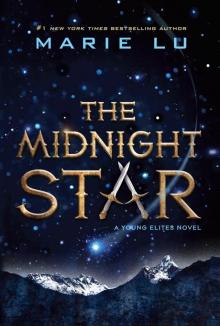 The Midnight Star
The Midnight Star Legend
Legend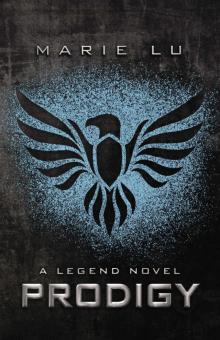 Prodigy
Prodigy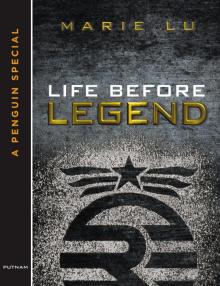 Life Before Legend
Life Before Legend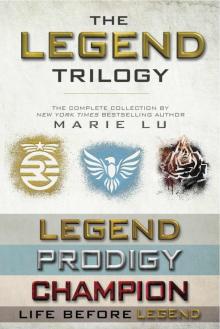 Legend Trilogy Boxed Set
Legend Trilogy Boxed Set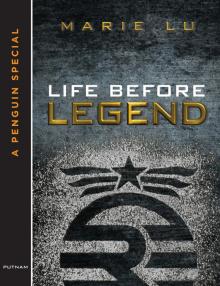 Life Before Legend: Stories of the Criminal and the Prodigy
Life Before Legend: Stories of the Criminal and the Prodigy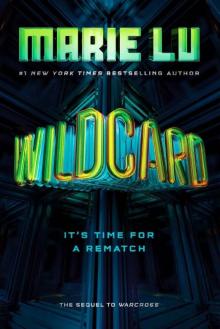 Wildcard
Wildcard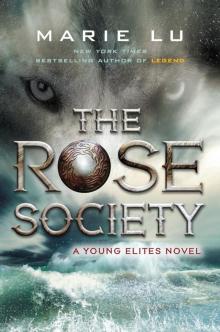 The Rose Society
The Rose Society Warcross
Warcross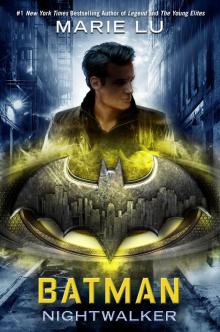 Batman: Nightwalker
Batman: Nightwalker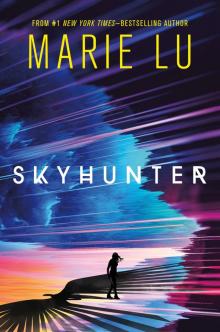 Skyhunter
Skyhunter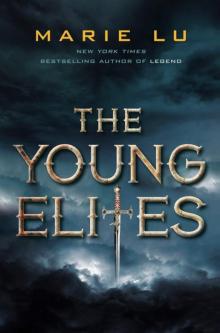 The Young Elites
The Young Elites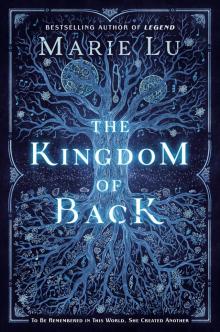 The Kingdom of Back
The Kingdom of Back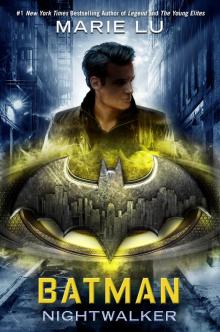 Batman
Batman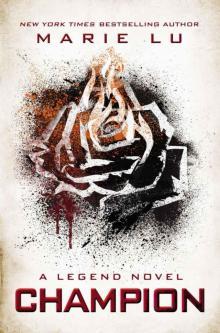 Champion: A Legend Novel
Champion: A Legend Novel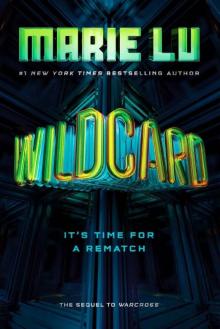 Wildcard (Warcross)
Wildcard (Warcross)